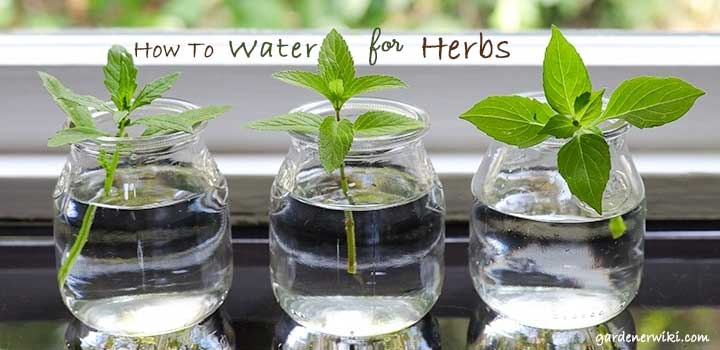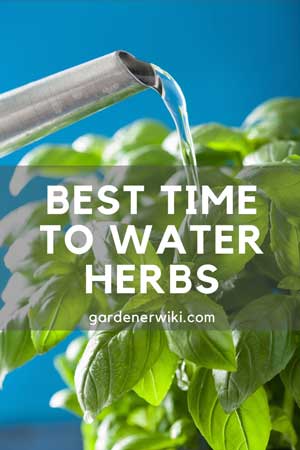Even if you happen to be lacking a green thumb, it is pretty easy to care for herbs. They can be easily grown in your backyard or small plant pots, as these are some of the easiest and most convenient plants to grow.
What makes caring for herbs easier is the fact that you do not need to put in a lot of effort if you choose the soil mix wisely.
And once you get the hang of exactly how to water herbs and which factors to take into consideration for watering them adequately, taking care of them becomes a piece of cake!
How to Water Herbs | The Process
When watering herbs, make sure that you are spreading the water evenly over the soil rather than pouring a lot of water near the base of the plant. Excess trapped water near the base of the plant might lead to the herb withering eventually.

A watering can will help you get the job done easily. Also, make sure that you do not water the plants from above because the leaves might fall victim to fungus due to excess moisture from the water.
Another factor that will help you get a better grasp of how much water your plant might need is the size of the planting pot, as the smaller pot gets rid of water relatively quickly.
How Often Should You Water Herbs?
You should water herbs twice per week if they are planted in your backyard. As for container herbs, they require more water, so watering once every day should work fine. If the weather is particularly hot, then you can water them twice per day.
The best time to water herbs is from 6 am to 10 am so that the water can be absorbed by the root properly without evaporating from sunrays. Be careful not to overwater the herbs, as that can lead to a dull, watery taste when you harvest the herb.
You can simply check the soil moisture every time before watering to make sure whether the plants need more water or water.
If the soil is very dry, you need to water the plant immediately. If you find that the soil is quite moist, you can skip the watering for that day.
Be mindful of whether the plant requires more or less water than the average herb. Every herb usually has different water requirements, so accordingly catering to them is the best solution to this.
How to Choose the Right Soil for Herbs
Herbs tend to flourish in well-draining soils. It is even more important to choose well-draining soil if you are growing them in containers. You can even opt for a soil-less mix that will help your plant retain the right amount of water.
One of the most common mistakes people make while planting herbs is choosing ordinary soil, as ordinary soil is not light enough to drain the water or help the water reach the roots fast.
Even if you are planting it in a backyard, you will still need to mix fertilizers in the soil for better water absorption.
If you are willing to put in the effort, you can make your own soil mix by combining soil, compost, and fertilizers.
How Much Sunlight Do Herbs Need?
You can leave your potted herbs near a south-facing window for up to six hours so that they get enough sunlight.
However, some herbs need fewer hours of exposure to the sun, so it is better to be mindful of which plant needs how many hours of sunlight.
If you find yourself struggling with how much sunlight or water every herb need, you can organize the plants into different rows or write onto the plant pot with a marker.
Which Fertilizer is Best for Herbs?
No matter the plant you are choosing, making organic fertilizer for herbs is always the best option.
As chemical fertilizers can ruin the quality of your soil when used multiple times over the years, it is far better to invest in slow-release nutrients that are organic and will last you a long time.

There are many liquid and powdered plant supplements that will help your herbs thrive. And the best time to mix them into the soil is before planting them into the plant pot.
You can use a concentration of compost tea, liquid kelp, and fish emulsion to spruce up your herbs in no time. All of these fertilizers are organic in nature, so you will not have to worry about whether using the fertilizer has ruined the quality of the soil.
Another great thing about using organic fertilizer for herbs is that these come cheap compared to chemical fertilizers.
And, if you feel lost in the aisle of composts and fertilizers, ask for help from the sellers. As a last resort, stick to any fertilizer that contains a high amount of nitrogen, as this ingredient will help the herb thrive.
Herbs do not need to be fertilized often, so the herbs will thrive even when fertilizing them once or twice a year after the initial soil mixing and fertilizing.
But be careful not to fertilize the herbs when the plants or leaves are drooping, which might lead to severe damage to the herb plant.
How to Fertilize the Herb Plants
If you plan to mix the fertilizer into the soil, make sure to get the right ratio of fertilizer to the soil while creating your own soil mix.
And when you need to fertilize your herb any time after that, you simply sprinkle granules of the fertilizers around the root base of the plant.
You can use a rake to easily and evenly spread the granules without de-potting your plants and save yourself from cleaning up the mess afterward.
When you are using liquid fertilizers, mix them with the recommended amount of water and pour them around the base so the solution can quickly reach the roots.
Make sure to read every label and instructions written on the packets of fertilizers; over-fertilization can ruin the taste of the herbs.
An easy way to know whether you need to fertilize the plants or not will be checking whether the herb has stopped growing for a while or if it looks dull in color.
Conclusion
Always remember to ask for the required amount of water, sunlight, and suitable organic fertilizers for herbs for your specific plant while purchasing them.
This knowledge and the initial care will help your plant thrive for a long time, and you will have the luxury of coming home to the rich aromas of home-grown herbs.
And now that you know the essentials about how to water herbs, you need to get started!